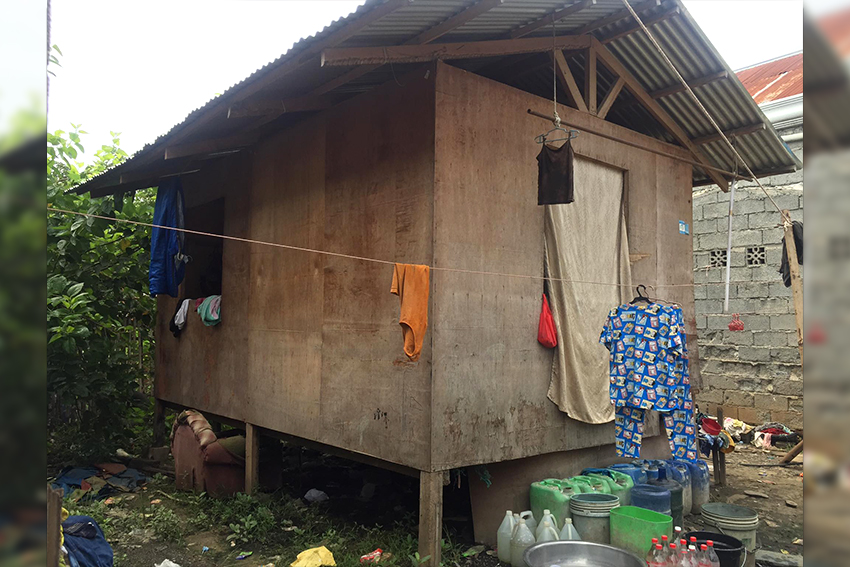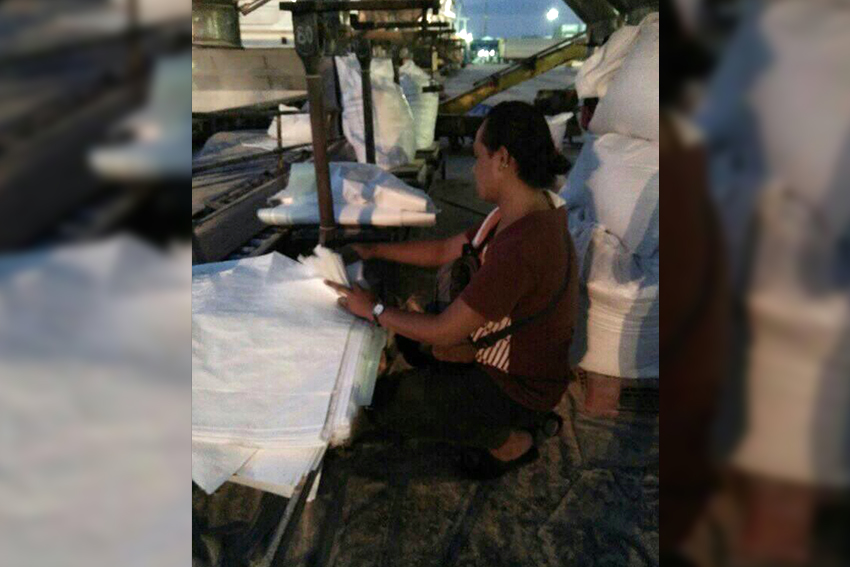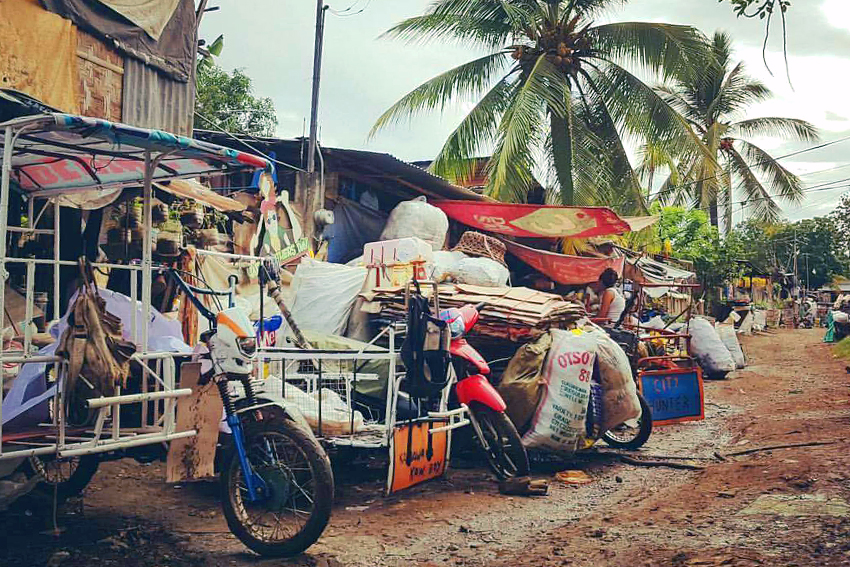
Gina and her family of 12 live in this shanty with no electricity and water. They need to buy water everyday for their needs. (Photo courtesy of Dexter Ogayon)
DAVAO CITY, Philippines – “Sometimes I think of running away from these. Every minute of the day I’ve been thinking how to feed my family,” says Gina, a 37-year-old mother, while she watches one of her youngest, a three-year-old walking in front of her shanty in one of the relocation sites in Davao City.
Her family of 12 only eats two full meals a day, and most times it is just rice doused in soy sauce or salt given to them by their neighbor.
Gina’s family survives by working with her stevedore husband, as a “pakyawan” worker in a fertilizer packing area in the city’s port. She earns P300 to P500 for packing 500 sacks of fertilizer three times a month. But she earns a measly P100 if rain comes. With this, she is left with only P30 after spending for food and fare.
But the pandemic changed this, as ships delivering fertilizers only come once a month.

Fertilizers that arrive on the ports provide short term work to stevedores who repack the materials. (Photo courtesy of Dexter Ogayon)
“I am afraid of COVID-19 because I have children relying on me. Our chances to find work is very slim because of the restrictions. Life has gone worse,” she said.
Sometimes, Gina earns P200 to 300 by cleaning and doing laundry to a household in one of the subdivisions in the city.
“We do not have a stable job that can support the needs of my family. What we earn is not even enough for a day’s food,” Gina said.
The Philippine Statistics Authority 2018 Family Income and Expenditure Survey in Davao Region cites that a resident needs P2,159 a month to meet the basic requirements of food and necessities to stay out of the poverty threshold.
To meet the basic food and non-food needs, a family of five should have a monthly source of income of P10,797 or a minimum income of P355 a day to get the entire family out of poverty.
But the pandemic has made life of the many working poor in Davao City a harder struggle.
In the case of 46-year-old Joanna, ten of her 16 family members tested positive for COVID-19 during a community-wide check. Three of these are children aged 13 years old to as young as a month-old baby.
“We live in one house. We only divide it into rooms since three of my nine children are already married. We only have one kitchen,” she said.
Her husband Jay, drives a taxicab but has opted to ply his taxi only twice a week to avoid contracting the virus. From his average earning of P1,000 before the pandemic, his income has been reduced to P500 or even less.
Joanna said that she used to sell street food of siomai, kwek-kwek and dried fish in front of her house to help in the family’s daily subsistence but this has stopped since customers rarely come nowadays.
The government provided social amelioration for the poor, but Gina only received P4,700 with a sack of rice and canned goods, while Joanna got only P2,700, for the entire two-month long enhanced community quarantine in the city.
The COVID-19 pandemic has worsened poverty worldwide. The World Bank estimated that an additional 88 million people will fall in extreme poverty in 2020 as a result of COVID-19 and this could possibly rise to 115 million with COVID-19.
Surprisingly, the poverty incidence of families in the Davao Region was rated at 13.7%, or and estimated 14 out of 100 families in the PSA 2018 Survey.
But the research center IBON refuted the report saying the survey used a ridiculously low baseline.
“The poverty threshold used for Region 11 is {71 per person a day. It means that this amount is enough for a person’s need for food, shelter, health care, and education. Obviously, every Davaoeño would find this insufficient for a decent type of living,” IBON Executive Director Sonny Africa said.
Dexter Ugayon, a 35 community development volunteer, could not reconcile that data with the reality they encounter with child laborers in a relocation area.
“Almost 70-80% are poor relocatees with on-call stevedoring and garbage collection as work,” he cited. “Even if they have been relocated, they still find themselves going back to their original place as their source of income is still there.”

Settlers who had been relocated from the city’s dump site continue to collect garbage and do the segregation in their homes. (Photo courtesy of Dexter Ogayon
The community is a relocation of families affected by fire and demolition in the past years. They also struggle to pay P400 monthly dues to the National Housing Authority.
Due to the pandemic, most of the stevedores working in port areas are divided into shifts on an on-call basis due to a skeletal working system. Garbage collectors, on the other hand, are forced to bring what they collected for segregation in their homes.
Several of them had been detained by police for violating quarantine and curfew since they have no identification cards for their work.
The National Economic Development Authority-Davao Region reported that the employment rate in Davao Region has dropped to 82.1% for the second quarter of 2020 while unemployment increased to 17.9%.
IBON estimated that there are now 14.2 million Filipinos unemployed or suffering from low wages and they expect things to worsen.
“The country’s economy is in the middle of a severe fall in history due to the militarist lockdown,” IBON added, referring to the government’s strict protocol measures with little relief for the middle and low-income families.
“With the pandemic and the restrictions in the movement of people, the life of the poor worsens as they struggle to put food in the table daily,” Ugnayan said.
“The government should look for appropriate livelihood opportunities that the community could develop and provide employment for the people to survive.” (davaotoday.com)
2018 Family Income and Expenditure Survey, Community quarantine, Covid-19 effect on economy, Covid-19 impact in Davao, davao city, davao region, duterte, Economu, IBON Foundation, Mindanao, National Economic Development Authority, Philippine poverty, Philippine Statistics Authority, poverty, Poverty threshold, Relocation, Single parent









